每日观察:关注DeNA财报及《模拟城市》社交版(5.10)
1)日本手机社交游戏巨头DeNA最近财报显示,公司在2011财年第四季度净销售额同比增长32%,达到5.29亿美元(422.36亿日元),营业收益增长19%,达到2.34亿美元(186.49亿日元)。
尽管旗下社交游戏中的kompu gacha机制是否将被制裁仍是未知数,但DeNA公司股票却因此而从本月初贬值20.9%。
DeNA总体营收情况表现强劲,但仍落后于竞争对手GREE。DeNA净收益同比上季度增长77%,达到1.345亿美元(107.54亿日元),而GREE在同一时期净销售额为5.781亿美元,净收益则是1.676亿美元。
从游戏在西方市场运营情况来看,Ngmoco推出的《SkyFall》DAU平均收益增加了5倍,而DeNA开发的《Ninja Royale》的同一数值也提升了15倍(游戏邦注:这款游戏植入了限时游戏活动,这是日本市场的一个普遍盈利策略)。
目前来看,DeNA西方用户转化率低于日本用户,Ngmoco高管Neil Young曾在3月份指出,DeNA日本用户平均转化率为10-15%,而Ngmoco的每日转化率仅为1.6-2%。
值得注意的是,DeNA与GREE一样,也没有在财报中强调最近备受争议的gacha机制,并指出gacha并非游戏虚拟货币Moba的主要消费驱动力。但实际上,DeNA在Google Play的头号游戏《Rage of Bahamut》高度依赖gacha机制,DeNA和GREE的许多卡牌战斗游戏的主要盈利来源也都是gacha。
DeNA在整个2011财年的销售额为18.2亿美元,营业收益为7.94亿美元,净收益同比增长9%,达到4.323亿美元。截止3月31日,Mobage平台在日本注册用户为3990万。
2)迪士尼互动传媒最近财报显示,得益于社交游戏业务的出色表现,公司在最近半年(截止2012年3月31日)的亏损低于去年同期,这一时期收益为4.58亿美元,低于去年同期的5.08亿美元,营业亏损为9800万美元,而去年同期亏损则是1.28亿美元。
3)据Fansite SimsVIP报道,EA已注册数个与《模拟城市》Facebook版本有关的域名,例如SimCitySocial.com、SimCity-Social.com和SimCityFacebook.com。
SimsVIP还发现了一个Facebook页面网址Facebook.com/SimCitySocial,以及一个Facebook应用地址http://simcity.game.playfish.com/g/fb/simcity,这些迹象表明该游戏很可能已经由Playfish投入开发。除此之
外,EA首席执行官John Riccitiello也曾在最近采访中透露,公司将在一个月内发布一款重磅社交游戏,种种迹象均表明关于EA将推出《模拟城市》社交游戏的传闻确有根据。
4)EA日前宣布与开发商Insomniac Games合作,将于今年夏季面向Facebook平台发布后者首款社交游戏《Outernauts》。
这是EA首次为第三方发行Facebook游戏,该公司之前推出的Facebook游戏基本上是出自EA Playfish和PopCap Games之手的作品。但需指出的是,Playfish曾为Atakama’s Labs发行《Little Cave Hero》(这家公司之后被DeNA收购),并通过《Restaurant City》工具条交叉推广该游戏。
5)在本周DAU增长最快的Facebook游戏榜单上,King.com旗下的《Candy Crush Saga》再次在榜单登顶,新增40万DAU,增幅达29%;《Bubble Witch Saga》新增30万DAU,增幅为5%。
迪士尼Playdom游戏《Marvel: Avengers Alliance》新增30万DAU,增幅为25%,位居第三。GameHouse新款连线消除游戏《Mystic Ice Blast》新增24万DAU,增幅达480%;Cookapps旗下的《Buggle》位居第五,新增15万DAU,增幅为41%。
中文游戏《麻将–神来也麻将》新增7万DAU,增幅为88%;Peak Games阿拉伯语卡牌游戏《كملنا بلوت》(Kammelna Baloot)新增5.9万DAU,增幅高达5900%;Innogames GmbH的经典神话角色扮演游戏《Grepolis》新增2.6万DAU,增幅为650%。(本文为游戏邦/gamerboom.com编译,拒绝任何不保留版权的转载,如需转载请联系:游戏邦)
1)DeNA sets new earnings record with $529M in sales and $234M in operating income during its fourth quarter
Kathleen De Vere
Japanese mobile-social gaming giant DeNA has reported a record quarter for sales and income. Net sales increased 32 percent year-on-year to $529 million, and operating income increased by 19 percent to reach $234 million in the company’s fourth quarter
Unfortunately for DeNA, uncertainty over the now-illegal kompu gacha monetization mechanic in the company’s top grossing card battle games overshadowed the results. DeNA’s shares declined 1.33 percent following the news, dropping to 1,935 yen. The company’s shares have lost 20.9 percent of their value since the beginning of the month.
Overall DeNA posted a very strong quarter, but is still behind arch-rival GREE. DeNA’s net income increased by 77 percent quarter-over-quarter, rising to $134.5 million (10.7 billion yen). During the same three month period GREE was able to generate net sales of $578.1 million and a net income of $167.6 million.
DeNA credited its growth to increased consumption of its platform-wide Moba-coin currency, which exceeded $640 million for the quarter with 40 percent of sales coming from smartphones. The company also highlighted its international expansion initiatives. During its 2011 fiscal year DeNA launched the Mobage network in China, South Korea, Europe and North America.
While DeNA didn’t break out performance by region, it did reveal that implementing Japanese style monetization methods has been an effective revenue driver outside of Japan. DeNA was able to boost the average revenue per daily active user (ARPDAU) by five times in Ngmoco’s SkyFall and by 15 times in the first-party title Ninja Royale by incorporating time-limited in-game events, a common monetization tactic in Japan.
The results bode well for DeNA’s plans to replicate its lucrative business abroad. So far western players have shown to have much lower conversion rates than Japanese ones. Ngmoco head Neil Young told us in March that on average, 10 to 15 percent of DeNA’s Japanese users convert on a daily basis, compared to Ngmoco’s 1.6 to 2 percent daily conversion rate.
Like GREE did in its earnings report, DeNA also addressed the Japanese Consumer Affairs Agency’s widely anticipated ban on kompu gacha. On the whole DeNA downplayed the news, reporting that in its farming, collection, real-time battle and royale games, gacha is not the main driver of Moba-coin consumption.
It is important to note, however, that card battle games (like the No. 1 ranked Google Play title Rage of Bahamut) do rely heavily on the mechanic, and the popularity of card battle games has been a major driver of growth for both DeNA and GREE. DeNA revealed it plans to increase multi-player and social content in its card battle titles in order to reduce its reliance on gacha in the games.
Tellingly, DeNA did not include a performance forecast for Q1 2013 in its earnings slides, stating it was “unable to make a reasonable estimate on the impact [of a kompu gacha ban] as the range of the issues in question remain unclear at this moment.” DeNA also revealed it is currently in discussion with the Consumer Affairs Agency regarding the matter.
Overall DeNA finished its fiscal year with $1.82 billion in sales and $794 million in operating income. Net income was up 9 percent year-over-year, increasing to $432.3 million (34.4 billion yen). The company currently has $721.6 million (57.4 billion yen) on hand in cash and cash equivalents. As of March 31, DeNA’s Mobage platform now has 39.9 million registered users in Japan.(source:insidemobileapps)
2)Disney Interactive losses narrow as social game transition continues
by Mike Rose
The Walt Disney Company’s Interactive Media division, which covers its console and social games, was the only sector in the company to record losses during the first half of the current fiscal year.
Disney Interactive’s losses narrowed compared to the same period year-over-year, however, thanks to lower company acquisition costs related to social games, and better social game and console game performance compared to a year ago, the firm said.
The company added that it released fewer console games during the fiscal half due to the decline in console game sales, although it noted that its console game results were slightly improved due to lower product development costs.
Disney’s ongoing shift from console games to social and other interactive platforms has improved the company’s results, it said, with more improvement expected in the second half of the fiscal year.
For the six months ended March 31, 2012, Disney Interactive posted revenues of $458 million, down 10 percent compared to $508 million year-over-year, and operating losses of $98 million, an improvement of 23 percent compared to last year’s losses of $128 million.
Overall, the Walt Disney Company recorded revenue of 20.4 billion, up 3 percent year-over-year, and profits of $2.6 billion, up 16 percent year-over-year.(source:gamasutra)
3)SimCity Social looks like a certainty now, and a smart one [Rumor]
by Joe Osborne
Here’s the thing: Rampant rumors and slant confirmations aside, mighty games publisher EA would be remiss not to bring a version of SimCity to Facebook. Now, the rumor mill has earned yet another spin. Fansite SimsVIP reports that EA registered several domains pointing to SimCity on Facebook, namely “SimCitySocial.com”, “SimCity-Social.com” and “SimCityFacebook.com” way back in last September.
But wait, there’s more. SimsVIP also spotted a Facebook page URL, “Facebook.com/SimCitySocial”, which redirects to the Facebook home page at the moment, as well as the following Facebook app address in the Facebook source code: “http://simcity.game.playfish.com/g/fb/simcity”. So, if there is, in fact, a SimCity Social Facebook game in the works, chances are Playfish is the team behind it.
Yet another tidbit of evidence pointing toward a SimCity Social on Facebook is that EA CEO John Riccitiello told viewers of CNBC’s Mad Money recently that the company will release a major social game “in a month from today,” and that it “will be all over the news.” There’s nothing like a direct competitor to CityVille to make headlines, no? We’ll see come June 8–wait a second … E3 happens in that same week. We see what you did there, EA.(source:games)
4)EA exploring social game publishing with Insomniac Games
Mike Thompson
Electronic Arts is exploring social games publishing. The company has announced a partnership with developer Insomniac Games on a new Facebook IP, Outernauts. This is the first time EA has published an original third-party game on Facebook, a development that wasn’t even mentioned during the company’s earnings call earlier this week.
This is the first Facebook game for Insomniac, the developer behind AAA console games like Ratchet and Clank, Resistance: Fall of Man and the upcoming Overstrike (which EA is publishing for consoles and PC). Insomniac’s been working on getting into the social games industry since it established Insomniac Click in March 2011; the studio is entirely focused on bringing games to web and mobile platforms. Chief Creative Officer Brian Hastings described the new studio as an expansion rather than a shift in focus, but getting into social games was a “pragmatic necessity.”
When President Peter Moore outlined EA’s upcoming social plans during this week’s earnings call, he mentioned that new games were coming but didn’t say anything about the company starting to publish original third-party social titles. While the development is surprising, it’s also easy to see why EA is looking to diversify its presence on Facebook to include publishing. Until now EA’s Facebook games have been in-house productions, mainly from EA Playfish and subsidiary PopCap Games.
The game could help shore up EA’s traffic on Facebook: the company’s daily and monthly active users soared last summer when it acquired PopCap and launched The Sims Social, peaking at 102 million monthly active users and 18 million daily active users. However, EA’s subsequent offerings like Risk: Factions have floundered and EA’s overall numbers have been dropping since September.
Publishing Facebook games represents a lower risk for EA, as it allows the company to try different kinds of games and might even give it access to new IP. Likewise, traditional developers that are expanding onto social platforms are likely to work with EA if they’ve had success doing so in the past. EA also has plenty of previous experience working with independent developers in the console space, on EA-owned IPs like Dante’s Inferno.
Clarification: It’s been noted that Playfish published Atakama’s Labs defunct game Little Cave Hero until the developer was acquired by DeNA. The game received some promotion in the Restaurant City bar, though it’s unclear if the game was cross-promoted across EA’s other social games at the time.
EA’s large audience and name-brand recognition also give it an advantage over other publishers like 6waves. The only bigger social game publisher is Zynga, but so far many studios have seemed reluctant to work with the company.
Outernauts is a role-playing game that that has players working as an “Outernaut” for United Earth. Outernauts have to capture and train alien monsters, explore the story behind the “ancients” of the galaxy and fight pirates and evil corporations. The game will feature asynchronous co-op and player-vs-player mechanics. The game will likely draw fans of Insomniac’s titles who are curious about what kind of Facebook title the developer will make. The game is scheduled for release this summer.(source:insidesocialgames)
5)King.com continues to top list of fastest-growing games by DAU
Mike Thompson
King.com’s Candy Crush Saga is once again at the top of our list of fastest-growing games by daily active users, gaining 400,000 DAU for a 29 percent bump. Bubble Witch Saga took the No. 2 spot with a 300,000 DAU increase, good for a 5 percent gain.
Disney Playdom’s Marvel: Avengers Alliance also jumped by 300,000 DAU for a 25 percent increase, taking the No. 3 spot. GameHouse’s new match-3 game Mystic Ice Blast seems to have finally come out of stealth, having gained 240,000 DAU for a 480 percent increase. Cookapps’s bubble shooter Buggle is in the No. 5 position with its 150,000 DAU gain, a 41 percent increase.
Three other games saw traffic increase by 50 percent or more. GodGame Inc.’s Chinese-language 麻將─神來也麻將 (“Also Mahjong Mahjong ─ God to”) is up by 70,000 DAU for an 88 percent gain. Peak Games’s Arabic-language card game كملنا بلوت (Kammelna Baloot) debuted with a 59,000 DAU jump for a 5,900 percent increase. Finally, Innogames GmbH’s classical mythology role-playing game Grepolis gained 26,000 DAU for a 650 percent gain.(source:insidesocialgames)

























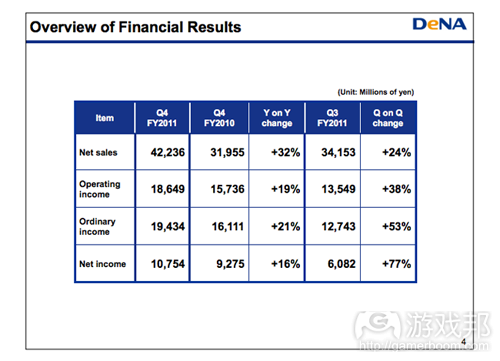
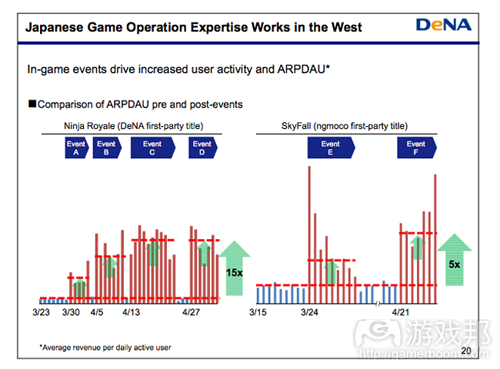
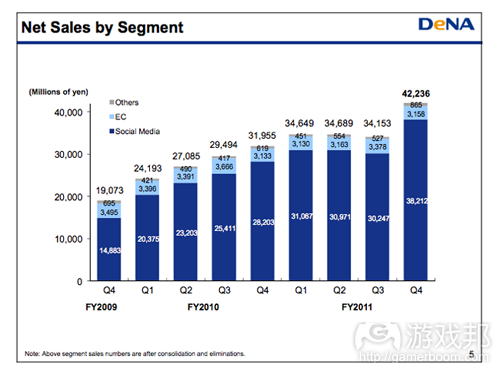
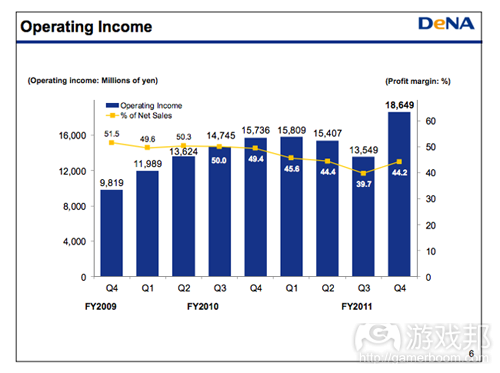
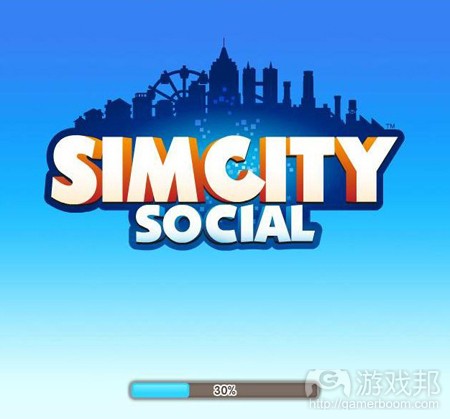

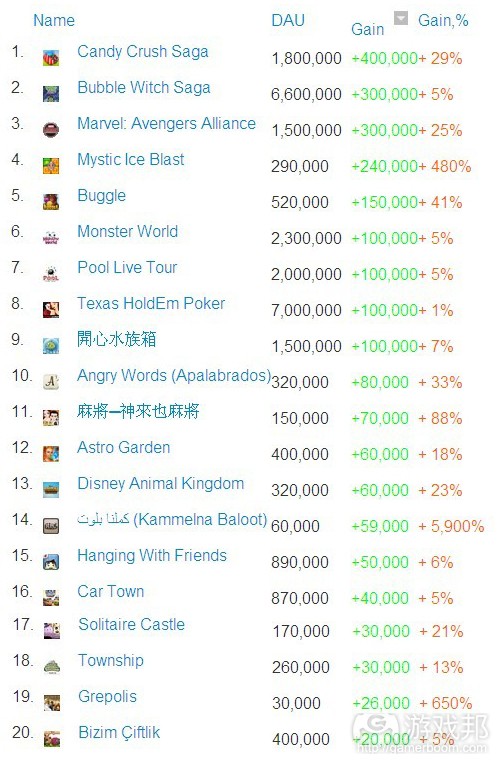














 闽公网安备35020302001549号
闽公网安备35020302001549号